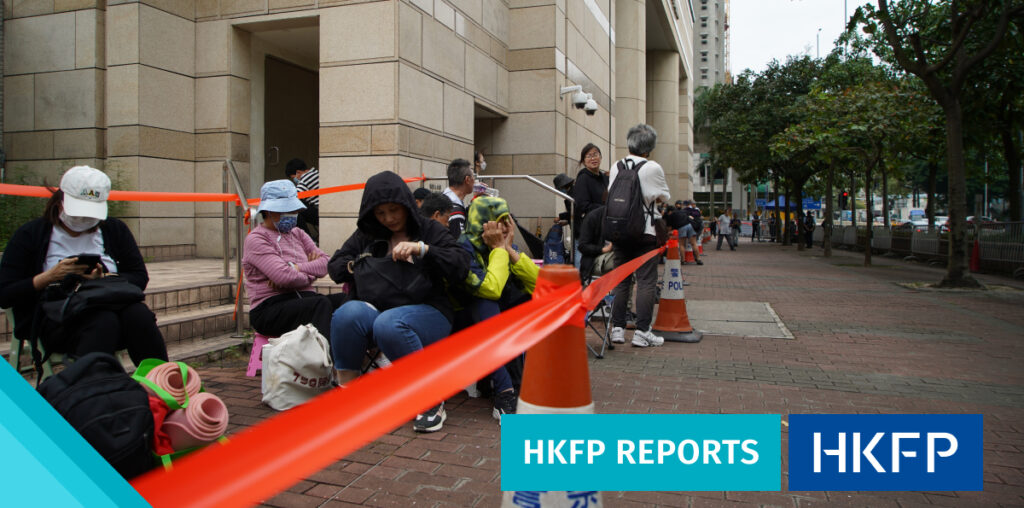A line of at least 60 people had formed on Monday outside a Hong Kong courthouse where 45 pro-democracy advocates are set to face sentencing in a landmark national security trial the following day.
On Monday evening, the Judiciary announced the number of seats that would be available in the public gallery of the main courtroom on Tuesday: five.

Of the 47 democrats charged with conspiring to commit subversion in the city’s largest national security case to date, 14 were found guilty in May, while two were acquitted. Thirty-one had earlier pleaded guilty to the charge.
The offence relates to their roles in an unofficial primary election held in a bid to win a controlling majority in an upcoming legislative election.
Former legal scholar Benny Tai and prominent activist Joshua Wong are among those set to appear before designated national security judges Andrew Chan, Alex Lee and Johnny Chan at 10 am on Tuesday to hear their sentences.


Local media reported on Sunday that a queue of more than 60 people had formed outside West Kowloon Law Courts Building, though none responded to reporters’ questions.
More than a dozen people approached by an HKFP reporter on Monday declined to say which case they were queueing for, and shook their heads when approached. Many were wearing masks.
The high-profile national security trial of detained pro-democracy media tycoon Jimmy Lai is set to resume in the same courthouse on Wednesday, with the Apple Daily founder taking the stand for the first time.
Some in the queue arrived after reading the news reports about the queue, suspecting that some people had been paid to line up for seats in the courtroom so that others could not attend the hearing. When the landmark trial began in February 2023, evidence emerged that some people had been paid to wait in the queue.


One woman who gave her name as “ET” told HKFP she had been in line for some 24 hours.
“When I saw on the news that people had came to the West Kowloon courts, I was stunned. Are they here because they care about the case, or are they just paid to get in line?” she said in Cantonese.
She gestured to the front of the queue, saying she suspected that about the first dozen people had been paid to line up.


Ko, who was also in line for Tuesday’s sentencing, said she was lining up to support former district councillor Andrew Wan, who represented the Shek Yam constituency for more than a decade until 2015.
She recounted how several households at her public housing estate had no hot water and that the Housing Department was not able to help for more than two years. When Wan was re-elected to the Shek Yam seat in 2019, he hired a surveyor and fixed the issue in three weeks, Ko said.
“I’m here on behalf of everyone from our neighbourhood,” said Ko.
Both Ko and ET were conversing with others in the queue on Monday afternoon, including elderly activist Lui Yuk-lin.


Also lining up for a seat in the main courtroom’s public gallery was former district councillor Lam Chun, who served alongside defendant and fellow ex-councillor Ng Kin-wai for Yuen Long.
Only five members of the public would be able to sit in the main courtroom for Tuesday’s sentencing hearing, however, as seats have been reserved for the defendants’ family and friends, as well as the press, the Judiciary announced on Monday evening.
“Since the number of seats are limited, only those members of the public who have secured admission tickets will be allowed to enter the designated public galleries,” the statement read.
Other members of the public will be seated in extension courtrooms “on a first-come-first-served and one-person-one-ticket basis.” Admission tickets will be distributed 45 minutes before the start of the hearing.
National security police presence
Chief superintendent of Hong Kong’s national security police Steve Li was outside the entrance of the courthouse on Monday, as police officers set up yellow vehicle barriers outside the West Kowloon Law Courts Building on Monday afternoon. The barriers had been set up around the building, near the main entrance and at a nearby bus stop.


The police had also parked a Chinese-made Sabertooth armoured vehicle on Tung Chau street, near the main entrance of the courthouse, and more than 20 officers were stationed nearby. Three officers from the Counter Terrorism Response Unit were seen patrolling the area.
Beijing inserted national security legislation directly into Hong Kong’s mini-constitution in June 2020 following a year of pro-democracy protests and unrest. It criminalised subversion, secession, collusion with foreign forces and terrorist acts – broadly defined to include disruption to transport and other infrastructure. The move gave police sweeping new powers and led to hundreds of arrests amid new legal precedents, while dozens of civil society groups disappeared. The authorities say it restored stability and peace to the city, rejecting criticism from trade partners, the UN and NGOs.
Support HKFP | Policies & Ethics | Error/typo? | Contact Us | Newsletter | Transparency & Annual Report | Apps
Help safeguard press freedom & keep HKFP free for all readers by supporting our team



